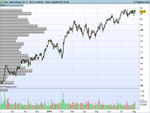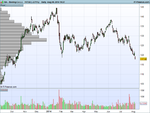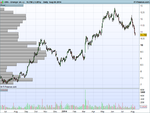trading w/o plan = driving car w/o metrics...
I could have filled my boots today, but didn't. Last night I wrote that short trades were becoming easier to find than longs and that on the CAC40, you were spoilt for choice. How right that was.
However, a mix of timidity and other commitments which kept me offline for much of the day meant I just took 2 bites of profit today.
My situation today really sums up why I am writing the journal. I know I can trade and am profitable but I lack the ability to transform that into something more professional that can sustain me and my family.
I will dwell tonight on my failure to grab fully at an opportunity that was there for the taking.
Hi, atters88,
What you are describing is so very true and open and honest, thank you! :clap:
I have indicated many times here in T2W several important NON-TRADING skills that MUST be learned, trained, conditioned, implemented, and systematically reviewed (in addition to trading/executing without errors!): :whistling
(1) 100% Focus (or lack of!) is a major factor for overall NET profitability/loss.
(2) Not having a systematic written Trading Plan = lack of structure.
(3) Not having a systematic written Trading Plan = lack of consistent schedule.
(4) Not having a systematic written Trading Plan = Errors creep into trading.
(5) Not having a systematic Debriefing Plan = difficult to document trading skills and performance (Net $ gains) improving over time/metrics.
(6) Not having a systematic bet schedule = suboptimal bets and inability to maximize winning runs/sessions when markets present "gifts" for our "styles".
Trading frequently and placing real live $$$ without a written Trading Plan turns the entire trading journey into a game of "feeling" vs "intuition"!
😕
T2W traders can easily find out - most family office & hedge fund and CTA trading desks do NOT accept discretionary trading. Traders have written Trading Plans, payouts are measured against trade performance metrics from the Trading Plans, and quarterly (or end of year) Bonuses are also based upon # of deviations from the Trading Plans' metrics. Note = even deviating from plan but getting more $$$ profit by "accident" is not appreciated; in fact, often Bonuses deducted some! :whistling
It is really good to see you searching and asking key performance-based questions (not necessarily direct trading execution)! Looking inside is evidence you are challenging yourself to push forward and grow as a trader. We either grow as traders - or we reverse direction and slide/decline in our trading performance. Really only two outcomes here - the choice is ours to make consciously!
👍
Additional thoughts and key questions for you:
(a) How can you improve your metrics to "score" your performance like "A" or "C+" or "F" or etc.? Note = "performance" does NOT mean $$$ results in this case!
(b) How can you systematically document trading errors, analysis errors? And implement specific action-items to prevent the same errors from entering back into your daily trading routines?
(c) How can you optimize your bet sizing (vs bankroll vs drawdown metrics) such that you can begin to increase trade size especially when volatility, momentum tools, indicate the market "climate" is very strongly in your favor?
Summary = trading w/o a Trading Plan, w/o specific performance metrics, w/o systematic Debriefings = driving a car from point A to point B but w/o any feedback from key metrics like miles traveled, fuel level, traffic info, status of oil, tire pressures, radiator fluid, brake fluid, etc!
You may get from point A to point B - but safely? Definitely not efficiently! :whistling
Good to see your trades unfolding with more specific criteria. Keep it up! Keep asking, refining, WRITING it down and make it more systematic! :clap:
Good luck, atters88.
Regards,
WklyOptions



